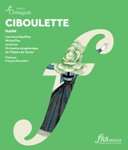|
Back
03/15/2015
Reynaldo Hahn: Ciboulette
Julie Fuchs (Ciboulette), Jean-François Lapointe (Duparquet), Julien Behr (Antonin), Eva Ganizate (Zénobie), Ronan Debois (Roger), Cécile Achille (Françoise), Jean-Claude Sarragosse (Monsieur Grenu), Guillemette Laurens (Madame Grenu), Patrick Kabongo Mubenga (Victor), François Rougier (Le patron, Le maire), Safir Behloul (Grisard), Olivier Déjean (Le lieutenant), Bernadette Lafont (Madame Pingret), Michel Fau (La comtesse de Castiglione), Jérôme Deschamps (Le directeur d’opéra), accentus, Christophe Grapperon (chorus master), Orchestre symphonique de l'Opéra de Toulon, Laurence Equilbey (conductor), Michel Fau (director), Bernard Fau & Citronelle Dufay (set designers), David Belugou (costume designer), Joël Fabing (lighting designer), François Roussillon (DVD director)
Recorded at the Opéra Comique, Paris (February 2013) – 145’ (operetta) + 31’ (supplement)
2 DVDs FRA Musica FRA009 (or Blu-ray FRA509) – Subtitles in French, English, German, Spanish, and Italian – Booklet in French, English, and German

   
This revival of Reynaldo Hahn’s 1923 operetta is full of charm but comes up short as far as drama - both in the music and the action - is concerned.
“Ciboulette” means chive and this is the name of the delightful central character portrayed by Julie Fuchs. The reason for her odd name arises from her family’s line of work. They grow vegetables (aha!) near Paris and she sells them at Les Halles.
Before we meet Ciboulette we are introduced to a high-maintenance lady, Zénobie (you can tell she is high-maintenance because she carries a small dog as a fashion accessory). She has two lovers: Roger, a captain in the hussars, and a wealthy but ineffectual young man, Antonin. We also meet the boss of Les Halles, Duparquet; he pops into the story throughout as a fairy godfather figure, and sometimes directly addresses the audience. The year is 1867.
At Les Halles we meet the popular Ciboulette. A fishmonger, Madame Pingret, tells her fortune; it is full of odd predictions which we subsequently see come to pass. She meets up with Antonin who is upset at losing Zénobie to the captain (although happy to be free of her extravagant bills). Ciboulette cheers him up and he falls asleep in her produce cart. The action then takes us to the suburban farm, where we learn that it is Ciboulette’s 21st birthday, and that she has managed to acquire eight fiancés. Antonin manages to finesse this sticky situation. One thing rather puzzlingly leads to another, and Duparquet offers to make Ciboulette a star at the Opéra Comique. In Act III this comes to pass and everything ends happily. I have omitted a lot of detail.
A character in the piece is the manager of the Opéra Comique and he is played by Jérôme Deschamps, the real-life director of that theatre. He gets to announce his own vocal indisposition.
The handsome booklet mentions that Ciboulette was created to help revive a genre threatened by the American musical of the 1920s and was deliberately “rather old-style”. What comes across is something like other works of the period (by Friml or Herbert) that eschewed the brassy ragtime or jazzy approach of so much popular music of the era. (The genre was lampooned by Rick Besoyan’s Little Mary Sunshine of 1959; the opening chorus of hussars in Ciboulette would fit right in.) There are some lovely songs (Reynaldo Hahn was a skilled evocative miniaturist) and they are well sung. It is a co-production with the opera companies of Toulon (thus their orchestra is in the pit here) plus St. Etienne; as a result the whole thing is well run-in and self-assured. However it can’t really rise above an impression of faded charm, in spite of an attractive production that makes every attempt to liven things up. One longs for the nonstop juiciness of Offenbach at his best.
One musical highlight occurs when Duparquet explains his history in a narration to music that conjures up what Puccini composed for the meeting of Mimi and Rodolfo: it turns out that Duparquet is Rodolfo (or Rodolphe), still mourning his lost Mimi some 30 years in the past. He and all the other bohemians have become government fonctionnaires. The strangest moment occurs when one Countess of Castiglione (performed by the production’s stage director, Michael Fau, in extravagant travesti) sings a song that is deliberately out of key. It takes talent to sing something that badly on purpose.
The production is still current and will be performed later this year in Paris. It might well have more impact in such a relatively intimate theatre versus a DVD.
Michael Johnson
|